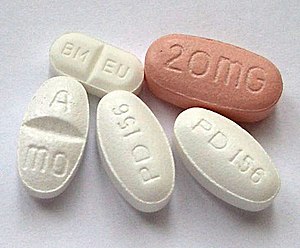 Image via Wikipedia
Image via WikipediaI had planned on another A.A. blog post today, either about individual members who try to cram their personal God down your throat, or what to do about the ones that want you to stop taking your meds "or you're not really sober."
But then, alas, up pops yet another female apologist for Mel Gibson, and I just couldn't let this one pass. Alicia Sparks is a layperson who writes for PsychCentral, which I usually recommend but am lately having doubts about.
"...think about why Mel Gibson (and anyone else, for that matter) has done these things," she writes.
OK. Here's my theory:
1. He drinks because he is an alcoholic.
2. He abuses women because he hates us. And because he can.
3. He uses intimidation, threats, and physical force to get his way.
4. He's bigoted because, well, because he's a bigot.
Ok, Ms. Sparks. Next?
"The verbal abuse and threats were bad, yes."
"Bad?" Oh, oh. Anybody else here see a minimization coming? Sure enough:
"The physical violence was bad, too (if there was any – there’s now speculation as to whether Gibson actually hit Oksana Grigorieva in the mouth, as she claimed, or if that all plays into the extortion theory)."The link takes you to a brief Entertainment Section story which refers to photos Ms. Grigorieva has given to the police of herself with damage to the veneers on two teeth. Apparently, "sources familiar with the medical charts, photos and examination notes of Grigorieva's dentist indicate there is no evidence Oksana was struck in the mouth."
Well, no sh*t, Sherlock. How could there be? Unless the dentist got DNA off Mel's fist from between her front teeth, all he can say is whether her injuries are "consistent with" or "not consistent with" being punched in the mouth. What he actually said in a sworn statement was that she showed signs of blunt force trauma, and that he was concerned enough for her safety to offer to shelter her himself.
So first, you have a non-professional blogging on a psychology website. Second, she's citing entertainment pieces as if they were investigative journalism. Third, she's accusing Ms. Grigorieva of extortion, and doing it without the courage to come out and say it directly herself, using the mealy-mouthed "there's been speculation".
OK, just for the sake of argument: I think I'd like to strike out on my own with a child, leave my husband. I think that I will cause myself some extremely painful, potentially permanently disfiguring injuries, and tell him if he doesn't give me money, I'll claim he did it to me. Does that make sense to anybody? And does anybody really think that Grigorieva bruised their daughter herself, to make money??
For what it's worth, the police have opened an investigation into the DV allegations. They have not opened one into the extortion claim.
Sparks is also conveniently ignoring two other little minor details, that being Ms. Grigorieva's description of the alleged incident on tape, followed by a little snappy repartee from Mel, to wit, "You know what? You f**cking deserved it." And then there's the photo of the baby, with bruises.
Details, details.
Next, Sparks asks,
But even amidst all that, it is possible to eventually set aside the inevitable shock and confusion and anger and evaluate the situation. If indeed Mel Gibson is suffering from untreated mental illness, which would be better: Hoping he seeks (and benefits from) professional help, or writing him off as a lunatic lost cause?Here, the logic breaks down entirely. But let's try to follow it.
#1. Who's confused? You? Not me. I see a clear case of domestic violence here. Yeah, yeah, I know, innocent until proven guilty and all that, but we are not in a court of law. This is a blog.
#2. If indeed, Mel is mentally ill, what does that have to do with anything? Domestic violence is not a mental illness. It is not even about mental illness. (It is not about anger management either, but that's another rant for another day). No, ladies and gentlemen, domestic violence is about power and control. Period.
#3. Bigotry is not a mental illness, either. Not as it is expressed in racism, anti-semitism, or hatred of women.
I defy Ms. Sparks to find me even one sloppy study that shows that bigots or wife-beaters can be helped with diagnosis and treatment of a mental illness.
Alcoholism, of course, is a disease. However, I would also like to see the study that shows that sobering a guy up will make him quit spewing hate-talk, making anti-semitic movies, and hitting people.
Just one. Even a sloppy one.
#4. Mel, according to friends quoted on MTV's website (yet another shining example of investigative journalism, I know, but there you are), is already in therapy. And he already knows he needs to quit drinking.
So what, exactly, is Sparks' point here? Is she saying he shouldn't be held accountable for what he's done? Does she want us to give him a pass?
#5. Who's writing him off? There's a straw man argument if ever I heard one.
No, going back to the title of her piece, I think what she wants is for us to have compassion for him. So I looked it up. Compassion means "deep awareness of the suffering of another coupled with the wish to relieve it."
Funny thing, that describes exactly how I feel about Ms. Grigorieva.


![Reblog this post [with Zemanta]](http://img.zemanta.com/reblog_a.png?x-id=d4e5ee5a-f0c8-42b4-85ef-bfb35f00b591)

![Reblog this post [with Zemanta]](http://img.zemanta.com/reblog_a.png?x-id=c3acbebd-a91f-476a-9d88-a26d76155e04)
![Reblog this post [with Zemanta]](http://img.zemanta.com/reblog_a.png?x-id=e6a4454e-8322-43f6-bf15-96dc2c7f62fc)
![Reblog this post [with Zemanta]](http://img.zemanta.com/reblog_a.png?x-id=aa1d4f5f-28d3-4495-aed4-47eace61bed2)

![Reblog this post [with Zemanta]](http://img.zemanta.com/reblog_a.png?x-id=98ee6871-7175-4a30-a2d3-1e6547a758ce)